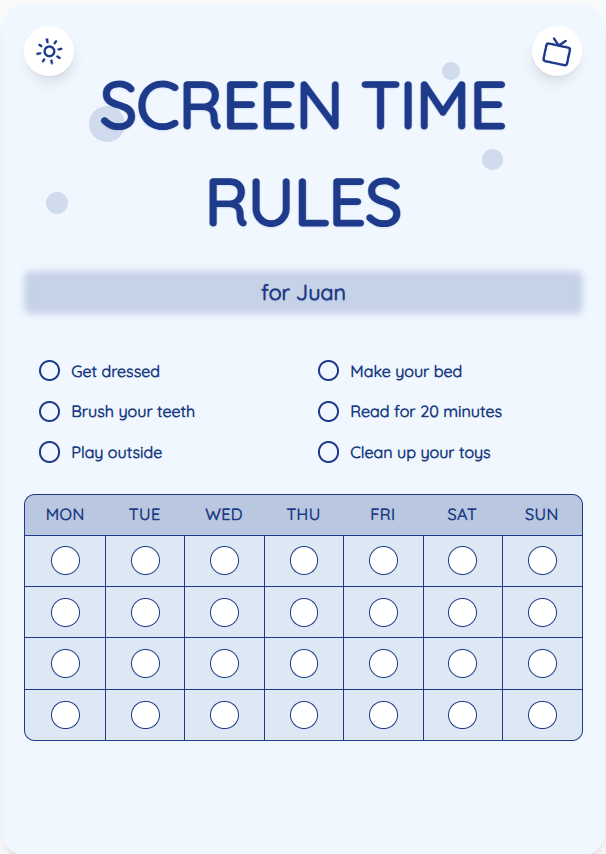The Significance of Screen Time Limits for Healthy Child Development
As a parent, understanding why setting screen time limits is crucial for your child's overall well-being and development is essential. In this comprehensive guide, we delve into the reasons behind the importance of managing screen time and provide actionable tips to help you strike a healthy balance in your child's digital consumption habits.
See What Your Screen Time Chart Will Look Like
Here's an example of a beautiful, customizable screen time rules chart you can create for your family

Impact on Cognitive Development
Excessive screen time can hinder cognitive development in children by affecting their attention span, memory retention, and problem-solving skills. Research shows that prolonged exposure to screens may impede brain development, making it vital to set limits to promote healthy cognitive growth.
Social and Emotional Well-Being
Screen time limits are crucial for fostering healthy social interactions and emotional well-being in children. Excessive screen use can lead to social isolation, reduced empathy, and behavioral issues. By limiting screen time, parents can encourage meaningful relationships and emotional intelligence development in their children.
Put These Tips Into Action
Create a custom chart to implement these strategies with your child
Physical Health Concerns
Managing screen time is essential to address physical health concerns such as obesity, poor posture, and disrupted sleep patterns. Encouraging outdoor play and physical activities over screen time not only promotes physical fitness but also reduces the risk of health issues associated with sedentary behaviors.
Practical Tips for Success
- Create a daily screen time schedule for your child and stick to it consistently.
- Encourage non-screen activities like reading, arts and crafts, or outdoor play.
- Use screen time charts to visually represent and track your child's daily digital usage.
- Set tech-free zones in the house, such as the dining table or bedrooms.
Frequently Asked Questions
How much screen time is recommended for children?
The American Academy of Pediatrics recommends no more than one hour of high-quality screen time per day for children aged 2 to 5 years.
How can I motivate my child to reduce screen time?
Engage your child in setting screen time limits and involve them in choosing alternative activities they enjoy. Offer incentives for sticking to the agreed-upon screen time rules.
What are the signs of excessive screen time in children?
Signs of excessive screen time include irritability when screens are taken away, declining academic performance, disrupted sleep patterns, and lack of interest in non-screen activities.
By understanding the importance of setting screen time limits and implementing practical strategies, you pave the way for your child's healthy development and overall well-being. Explore our screen time chart generator on ScreenTimeRules.com to simplify the process of managing your child's digital exposure effectively.
Ready to Transform Your Family's Screen Time?
Join thousands of parents who have successfully managed screen time with our customizable charts.
